He may be NAU’s head coach-in-waiting, but Jarred Cornfield is hardly standing idlily by tapping his foot and measuring the office for new drapes while waiting for June, when Mike Smith steps aside as director of cross country and track and field and Cornfield takes the reins.
Rather, Cornfield is as busy as he ever was, fulfilling his role as associate head coach and Smith’s close confidant, as the Lumberjacks’ cross country season heats up with its first big meet of the season Friday at the Joe Piane Notre Dame Invitational.
But the year-long transition and torch passing already has begun, with Smith’s new gig running a pro team in Flagstaff for Nike looming on the horizon, and Cornfield, in his 10th season at NAU, shadowing his predecessor and gearing up to take charge in 2025-26.
In a way, Cornfield’s ascension seems fitting since the 33-year-old who has four children, ages 2 to 8, with his wife, Meghan, has had only one employer in his adult life: NAU.
This deliberate torch-passing mirrors 2016, when Smith was the coach-in-waiting and stood by Eric Heins in his final season. In his first extended interview since being named as the incoming director in August, Cornfield talks about how the change was made, his thoughts on the difficult task of taking over a dynastic cross country team, how he plans to tweak, if not change, the program, given the altered NCAA landscape of NILs, the transfer portal and new rules limiting rosters.
The following Q-and-A has been edited for clarity and space limitations.
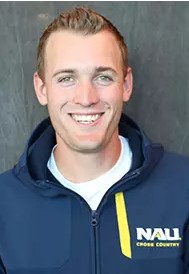
FRN: Before we get into the subjects of your new job and the transition, how did a guy from upstate New York and Liberty University in Virginia wind up nine years ago as a graduate assistant at NAU?
Cornfield: I had no connection with Flagstaff. I really didn’t know much about altitude. I didn’t know Flagstaff was at altitude. My perception of Flagstaff was what most East Coast people think Arizona is like: the desert. I was emailing coaches from across the country, trying to find any opportunity. A graduate assistantship would have been ideal. Most of the time, you just get no, because there are limited positions available. I had emailed Coach (Eric) Hines a couple times and followed up. … I had a phone conversation with him and Leah Rosenfeld, an assistant at the time. We had a pretty casual conversation about coaching. At the end of the conversation, he said, ‘Hey, if you wanted to come volunteer out here, great, but it sounds like you could get something better.’ Two weeks later, Coach Hines sent me an email saying, ‘Hey, we had a GA lined up but he decided not to come. Would you want that position?’”
FRN: How long did it take you to say yes?
Cornfield: I was in bed, coming off a major back surgery. So I was doing all this lying down. I remember getting up and telling my wife – we had gotten married six months prior – ‘Hey, I think I just got a job.’ It was very much a timing thing.
FRN: How many times did you hear “no’ before this?
Cornfield: It was usually just no based on there wasn’t an available position.
FRN: Do you realize how fortunate you were? I mean, going to not only a D-1 school but one that was one of the top programs in the nation?
Cornfield: Yes. I was super excited. Part of it, sure, was luck, but part of it was that I really wanted to pursue this. I put myself in a position to be luckier than others. I was pretty persistent and proactive. I had a spreadsheet of when I sent my emails and when to follow up. I was thinking, it’s only going to be two years, but it’s a great start.
FRN: What did Meghan think about coming all the way out here?
Cornfield: That was a scary thing. She’s from Lynchburg, Virginia, which is where Liberty is. So it was kind of a big thing when I told her mom, ‘I’m taking your daughter all the way across the country a year into being married. (Meghan) was excited for an adventure, and we didn’t have any kids. It was time we could take a leap.
FRN: Why did you want to be a coach? I know that’s an open-ended question, but …
Cornfield: In college, you get to that sophomore-junior year, that second half of college, and you start thinking you’re going out into the quote-unquote real world, and you start thinking what you want to do. The conversations I had were, what are the parameters around it, rather than specific (professions). I really wanted to spend my time doing something I loved. Vocation takes up a lot of your time, so you want to enjoy that time. I like hard work, but I wanted to do something I was passionate about.
I also was drawn to doing something where I’m building relationships with people. Some vocations don’t have that. And I’ve always been super competitive and I fell in love with this sport … It was two years, and if I don’t like it, OK, do something different. I think I probably would’ve pursued something (else) in sports. But in those two years, it solidified in me that, yes, I really enjoy this and I want to keep doing it. I’m forever grateful to Eric Heins for giving me the opportunity.
“I am conscious this year that Mike is the director, not me. But there are a lot of things trickling in (now) for next year when I’m the director. So my role is already changing. But I’m conscious, like (Smith) was with Eric, not to overstep my bounds. It’s pretty easy with Mike. We have such a great relationship over so many years. It’s going great.”
Jarred Cornfield
FRN: Let’s jump way ahead now. You were around in 2016 when the coach-in-waiting transition between Eric and Mike happened. Did you watch how the two interacted, and how does that inform your situation now where you’re the coach-in-waiting? It’s a different situation, I know. You’ve been at NAU nine years and Mike had just come in from Georgetown in 2016. Are there similarities?
Cornfield: Definitely. That was a unique transition (in 2016). It doesn’t happen often. I remember a lot about the transition. It was my second year here. Those two and the way they collaborated was really fantastic to watch, because they both were able to take out ego. That’s the biggest thing. Mike was very respectful that this was Eric’s last year and he was head coach, and Eric made sure to get Mike involved and start building relationships that fall. They both were so fantastic through that entire season. We won our first title. I attribute a lot to those guys not causing anything (harmful). If anything, they enhanced the situation by working so well together. Mike and I both have a longer background together.
FRN: And the runners know you, too, already. I don’t know if you’ve read Matt Baxter’s book (“Running Up the Mountain”), but Matt wrote that he and Tyler Day were skeptical, saying, ‘I don’t know about this new guy (Smith).’ But it’s not that way now, because you’re already here and you recruited these people, right?
Cornfield: Right. But, definitely, I am conscious this year that Mike is the director, not me. But there are a lot of things trickling in for next year when I’m the director. So my role is already changing. But I’m conscious, like (Smith) was with Eric, not to overstep my bounds. It’s pretty easy with Mike. We have such a great relationship over so many years. It’s going great.
FRN: Would you say your role is the same as the last few years, or is this promotion hanging over your head a little bit? At least, with the athletes, because they know you’re going to be the guy soon?
Cornfield: There’s been some things. I am getting more involved in decision-making. There’s always things that are coming for next year, whether that’s recruiting or lots of things. It’s actually been really fun these last few months after Mike has known his direction and I’ve known mine. I don’t feel much stress, and it’s actually kind of nice that we didn’t have to rip the Band-aid and have it happen all at once. I’m speaking with more athletes, especially the younger ones and talk about next year. But Mike’s still here and there’s no rush for anything.
FRN: Walk me through the timeline of how all this went down. Mark Wetmore leaves Colorado. Everyone says and I think it was even written that you were a finalist for the job. Mike was in talks with Nike. You probably felt you were ready to be a head coach. And you both had the Olympics thrown in, you coaching Elise Cranny and Mike with his group. How did it all come together?
Cornfield: It was a really crazy summer for both of us. The NCAA championships were mixed in with the Olympic Trials. We were in Eugene 21 days of the month and taking care of our athletes. You’d have to speak to Mike about his timeline with Nike. Mike asked for my advice and opinion on certain things and I don’t try to pry into his personal business. He brought it up to me at a time that was right for him. We were able to talk about the possibility of me taking over NAU. That was just before the Olympics. I was really excited to explore that and speak more with the administration about how my role would look.
I had felt more prepared for a head coaching job, but I wanted to be really picky about where that would be. It had to meet the criteria of, number one, be a good fit for my family, and I place I felt excited about. I’ve said no to certain things over the last couple of years and was very content being at NAU with Mike. I was really grateful how it turned out.
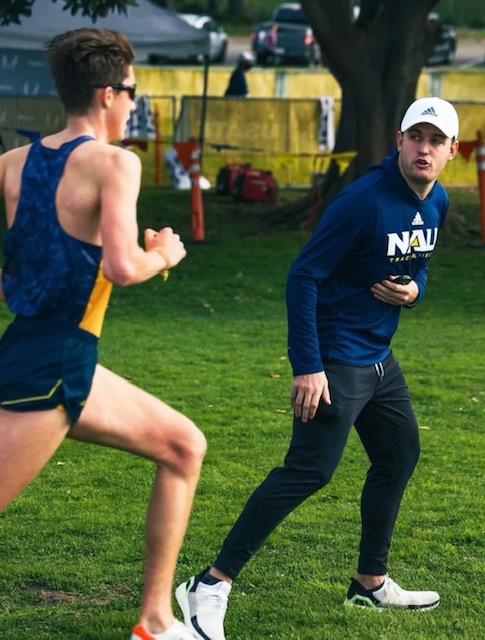
FRN: So you say you had other opportunities. Did you think you were ready then? Or is it just now the right time?
Cornfield: I think I would’ve been pretty prepared back then, but it didn’t spark my interest more than where I was at. The value of being under someone like Mike Smith is very, very high. I really care about my craft and how I learn as a coach. I wanted to be patient. Yes, there are some opportunities I might have done well in, but it wouldn’t be as fun as how it was to be at this place and live in Flagstaff.
FRN: When I spoke with Mike last summer, he said he didn’t think Hines was ever going to leave.
Cornfield: Yeah I thought the same thing (about Smith). I never pictured myself being the director at NAU, because I always pictured Mike doing that. I’m super happy for Mike. He made decision for himself in the same parameters I would want to make decisions for me – family. I’m happy for him and bummed that I won’t be working with him (after this year), but I’m happy we’re both going to be in the same place (Flagstaff) and grow our friendship. We’ll bounce ideas off each other and continue to do that.
FRN: As I was driving over here, I was trying to think of an analogy of someone replacing an iconic coach, maybe whoever had to replace Vince Lombardi. That’s kind of your situation. You haven’t done it yet, but how will being the head coach be different than even the associate head coach?
Cornfield: I’ve played a bunch of roles at NAU and within each I asked, how can I maximize this role to aid in Mike’s direction and vision as leader. That was my job. There will be certain things I’d have to delegate more and hire people. I need the staff to be able to fill in some of the those pieces. It’s something Mike is already helping me with. He was grooming me to be a director because he knew that’s what I wanted. He also was great in not giving me too much for the stage I was in as a young coach.
“To me, recruiting is the lifeblood of a program. You got to bring in the right people. You could be a really good job, but you need the people to coach. So, it’s definitely going to still be part of my responsibility as a director, but it’ll look a little different.”
Jarred Cornfield
FRN: Let’s talk about recruiting. The athletes say you are the first point of contact in recruiting and they get to know you well before Mike comes in. They lavished praise on you as a recruiter. Are you going to be able to continue that as director, or will that be delegated to Sadie Baker and whoever else you hire?
Cornfield: Recruiting has been a big part of my role. To me, recruiting is the lifeblood of a program. You got to bring in the right people. You could be a really good job, but you need the people to coach. So, it’s definitely going to still be part of my responsibility as a director, but it’ll look a little different. What’s important is to have good assistants but on top of that have a good system. Recruiting is a collaboration and there are steps to it. Sadie has already been fantastic in her recruiting role. But I’ll still be involved, for sure.
FRN: You and Mike – and I guess just you next year – don’t always look for the Nico Youngs out there. I mean, it’s great when you get a Nico Young, but this program has developed people like Tyler Day, Annika Reiss, Abdihamid Nur – people good in high school, maybe won a state championship, but not the big flashy prep stars. So what are you looking for in a recruit?
Cornfield: There are several components. First, in the questions I ask recruits, I’m looking for very particular things in their conversation. It’s tricky because some of these athletes you are recruiting are16, 17 yeas old. When I was 16, I was immature. Not in a negative way. You’re just young. So you also have to realize this person will grow a lot. I can’t base everything off them just being a 16-year-old. Ther are nuances to that. I look at what they value and why they want to do this, their relationship with running and their relationship with team; that’s very important. Yes, we look at their performances but also how they move and their mechanics. Ultimately, you are guessing what they can be in the future. It’s always a role of the dice in some ways. But we have a really good system that identifies people we think can not only be good runners but to aid in what we’re trying to do as a team. We’re very picky. We’ve definitely said no or not offered spots to fast people on paper that we didn’t think would be a good fit in other ways. Ther are so many factors. We’re not just a program that brings in high-volume recruits.
FRN: The landscape of the NCAA in the last two years has changed a lot. NILs. The Transfer Portal. The new rules coming up capping the roster limit at 17 for men and 17 for women and track at 45 each. You’re coming in at a transition time for your sport. How are you going to deal with these challenges?
Cornfield: Certainly, some of these changes are very large. But even in my short time as an NCAA coach – this is my 10th season – there’s been changes all the time, maybe not as massive and some of the ones coming. It’s kind of a normal part of working in the NCAA is being able to adapt, not freaking out and just thinking systematically through these pieces as they come. I’m also not worried because of the tremendous support we get from NAU Athletics administration, from Mike Marlow. Our conversations with them in working through these changes have been super. I’m excited about tackling these challenges and there are challenges with these changes. What we have with this mid-major program and what we have with track and field and cross country is great. They are behind us.
FRN: Look at how the portal has changed teams and how international recruiting has changed things. You guys have taken advantage of it some, but not a lot. NAU’s philosophy has been to develop teams, but it seems like now you get instant teams. Oklahoma State brings in East Africans and Arkansas brings in 28-year-old freshmen. Do you think NAU should adapt and do this? I know you’ve had Australians and New Zealanders and Brits, but does NAU need to join the crowd and bring in guys with fast times?
Cornfield: I look at it as through the lens of what do we value and prioritize most as a team, and what are the components of people who will fit in well with that. That informs me in recruiting. We don’t limit ourselves in recruiting all across the world or on the transfer portal or U.S. high schools. But no matter where you’re from, you have to meet those criteria. In some yeas, it may just be all high school kids, or you may have a couple more transfers. There’s been transfers we’ve said no to, or internationals. … It has to be the right fit. That’s what guides or model and created consistency for our program. I want that more than anything else? Consistency and the right type of culture, which I think will yield the right type of results. I don’t feel we’ll need to change that.
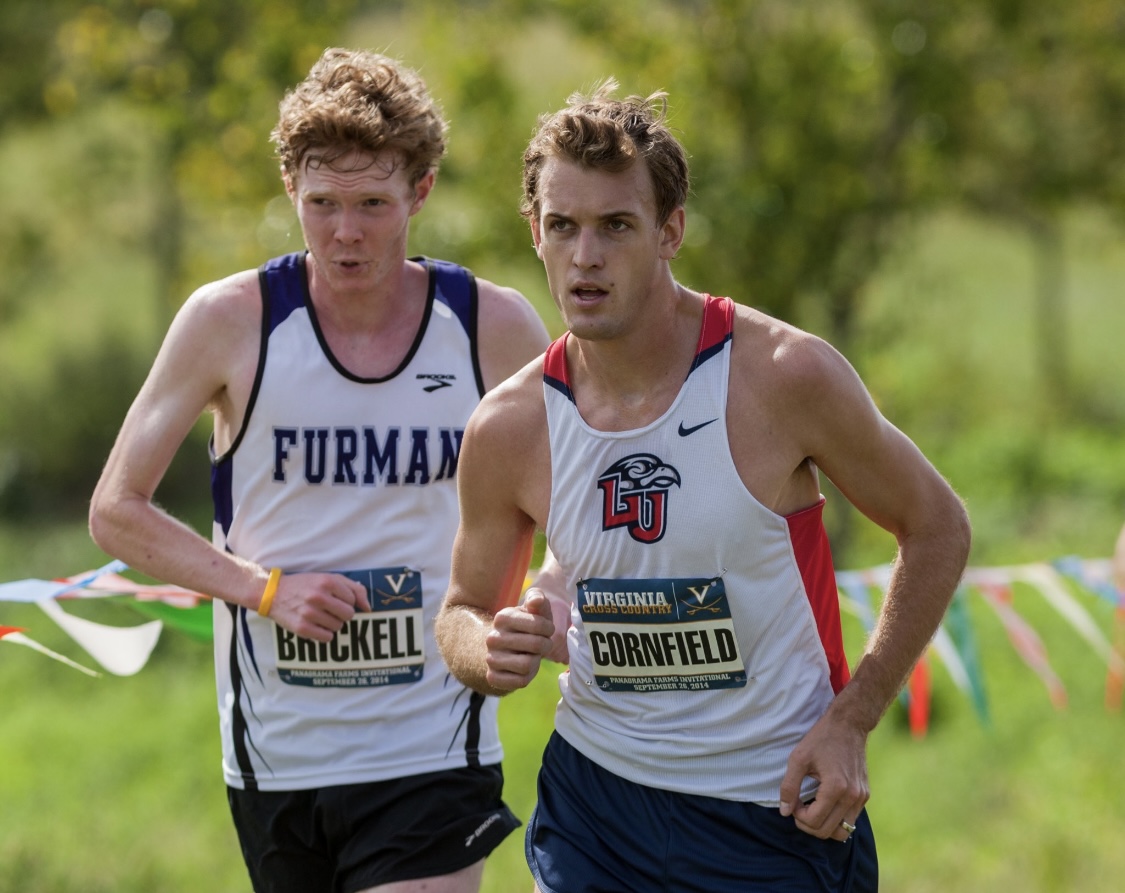
FRN: So, OK, the short answer, in the short term is, no, you’re going to keep things the same. What about in other aspects. How does your coaching philosophy differ than Mike’s? You’re your own person, not a carbon-copy of Mike Smith, good as he is.
Cornfield: It doesn’t differ much. Part of that is – and I’m proud to say this — I’m heavily influenced by him and his teaching. He’s been at this longer and I’ve relief heavily. We’ve done this together for almost nine years. We’ve been together every step of the way as we’ve changed and evolved this program. Right now, it’s going to look the same, but I hope I continue to change and evolve as we did together. It’s not being stuck in the same thing, but being creative and open to change.
One thing Mike’s taught me is listening and seeking and being very curious. If I can keep those traits, it’ll keep me evolving.
FRN: I don’t know you well, but you seem positive and really earnest and you level with people. Being from Liberty, which is a pretty religious school and being a former school-schooled kid, how does your religious faith inform your coaching and interpersonal relations with athletes.
Cornfield: When I think about me as a person, I think about what I value and also my security for me as a person. For me, personally, I draw that security from my faith and relationship with Jesus. That definitely guides the way I live my life and it certainly impacts my coaching in the way I treat people. That was a massive thing in me wanting to be in a vocation that has to do with relationships. In coaching, treat people extremely well and treat them as human beings. I see my position as an act of service towards these young people, and I don’t take it lightly.
I’m extremely competitive and want to beat people. I care about this craft and I probably get like a psycho sometimes from the passion of pursuing this. But I think my faith and people around me keep me grounded so I don’t get lost in that. Finding the right balance is what you want coaching people at this level.
FRN: You’re dealing with athletes that may have different belief systems than you – maybe a Muslim, maybe an atheist, maybe how knows what – and there’s a stereotype of religious people, Christian, Jewish, Muslim, Hindi, whatever, that they are centered on that religion and stress that. But it seems the way you treat your athletes is individually and you’re not bringing your faith to the surface, right?
Cornfield: Mike taught me this: We have maybe 40 distance athletes and 90 to 100 track athletes, and we try to create a space and environment where people can feel honest and authentic and can communicate that way, and that requires a lot of care for them, right? I love it when we have a really diverse team on where they come from and what they believe, how they view the world. If you can have that and also create a space where people can be themselves, you can learn a lot from people and share ideas. That environment is challenging, but when it’s cared for correctly it can be every impactful for people’s growth.
I can only control the ways I speak and act so I always want to be very thoughtful in the way I want to do that, especially moving into a director role, where your words have great power. You have to be responsible for that, but it can also yield great good. Ultimately, I just want to be really good to people and I look to my faith as an example of that. IT’s an amazing example of how to treat people.
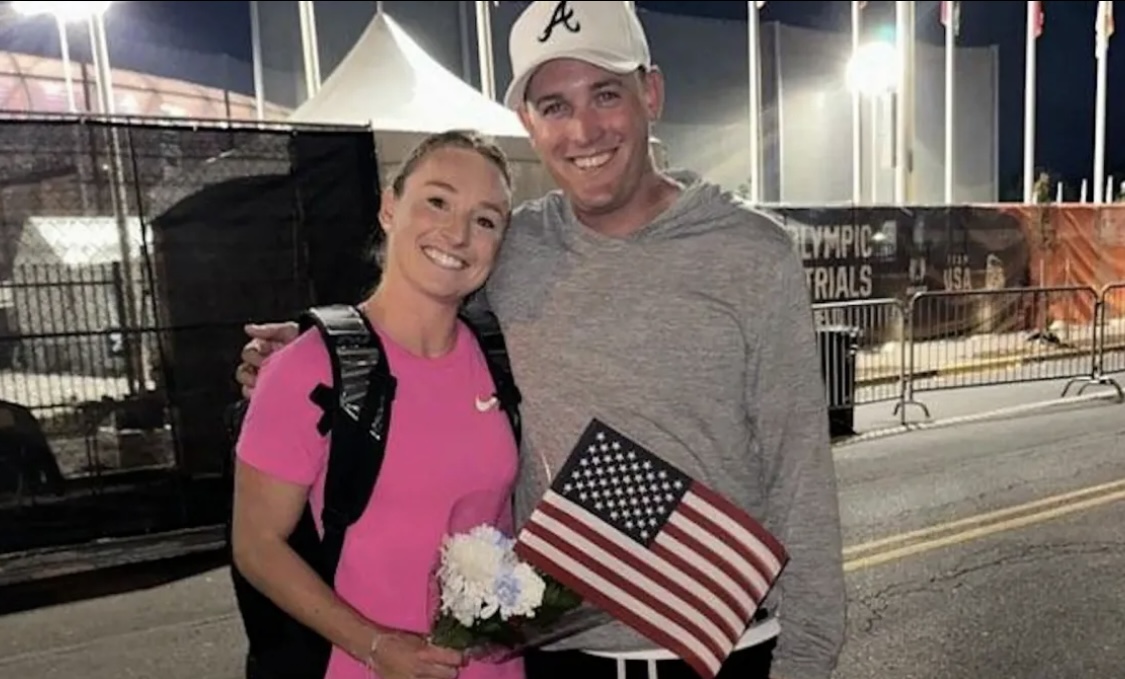
FRN: Changing subjects: Tell me about coaching Elise Cranny. How did this come about? And, are you thinking about being a Mike Smith and expanding your pro roster?
Cornfield: Elise and I met before I started as a GA at NAU. That summer before I got here, I connected with a coach at Stanford who invited me out to their high school camp. I got there and we were paired in the same group together. We spent a lot of time together and hit it off and stayed as friends for years. When she became a professional athlete, she’d do stints here in Flagstaff, so we’d see her more. She’d come over and play with my kids and stuff like that.
FRN: Were you surprised when she asked you to coach her?
Cornfield: She texted me asking if she could get on the phone with me. That was in March of this year. I could tell she wanted to talk about something specifically. My mind never went to, oh, she wants me to coach her. But that’s what the conversation was about, and we had more conversations after, working through all of it, making sure we were on the same page. I’ll still be coaching her, but she’ll be the only person I’ll coach outside of NAU. It’s a big responsibility, but you only have so much capacity. My number one priority is NA
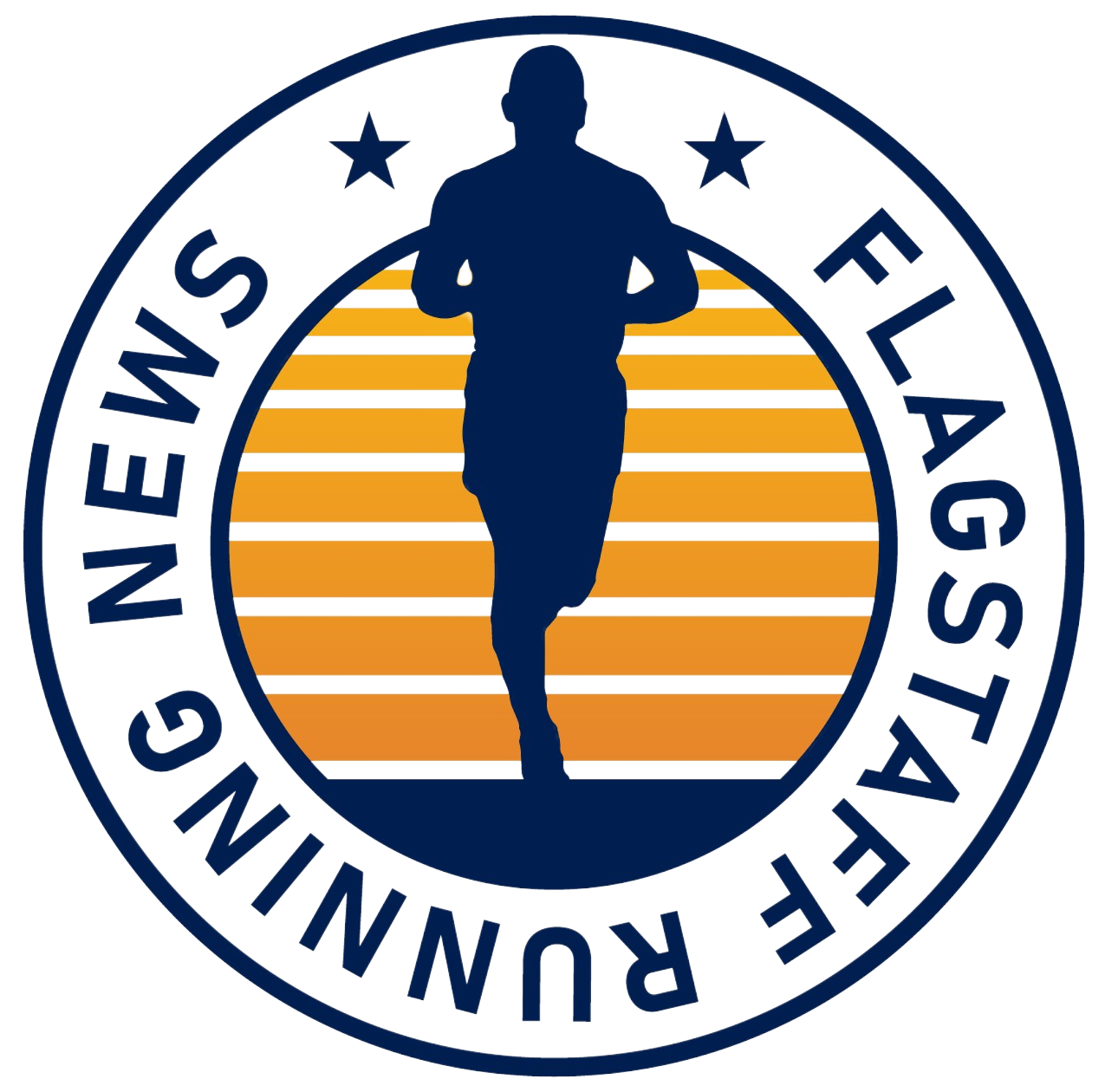
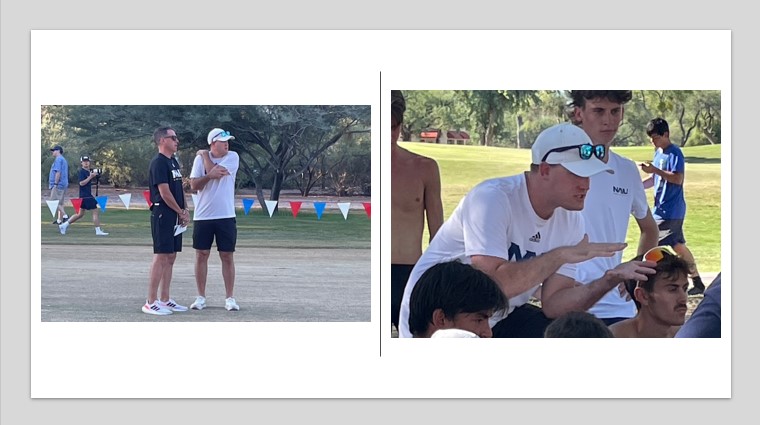
Leave a Reply